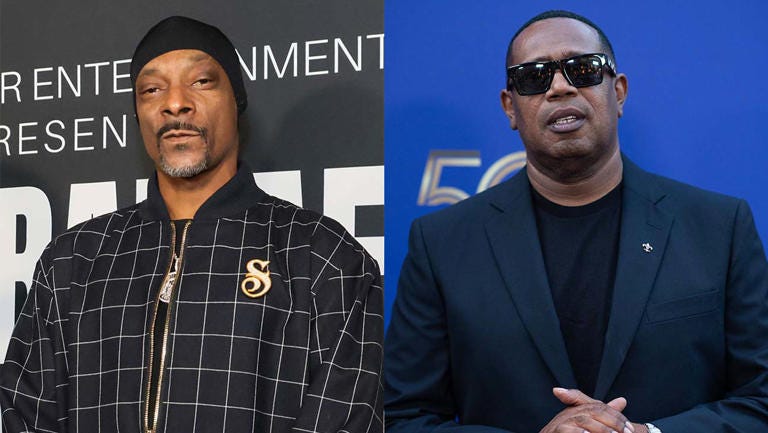Entrepreneurs and Corporate America Battle in Court
Someone isn't being entirely honest. Who's going to get caught being deceptive or telling wild lies?
The headline is gives off strong, negative first impressions of corrupt corporate power: Snoop Dogg and Master P Sue Walmart, Post for Sabotaging New Cereal Brand
Etan Vlessing tells the story in the Hollywood Reporter and if one thing is clear it’s someone isn’t telling the truth, the whole truth and nothing but the truth.
Rappers Snoop Dogg and Master P allege that “their minority-owned cereal brand was kept off store shelves to thwart its launch,” Vlessing writes. “Snoop Cereal, from Broadus Foods, was launched in 2022 by Calvin Broadus, also known as Snoop Dogg, and Percy Miller, aka Master P. They aimed to create a family-owned company that also added diversity to the food market.”
At the heart of the argument, the lawsuit says “Post never carried through on its promises to Broadus Foods and instead set out to sabotage the Snoop Cereal brand,” Vlessing writes.
"Essentially, because Snoop Dogg and Master P refused to sell Snoop Cereal in totality, Post entered a false arrangement where they could choke Broadus Foods out of the market, thereby preventing Snoop Cereal from being sold or produced by any competitor," the lawsuit states.
After Post introduced the product in Walmart stores in the summer of 2023, "The cereal was an immediate success. However, within a few months, customers could not locate Snoop Cereal in the aisles of their Walmart store," the lawsuit states as the product was held back in stockrooms without being rolled out into store aisles, Vlessing reports.
“Dogg and Master P also allege that customers who attempted to order Snoop Cereal online were wrongly told the product was out of stock to keep the newly launched product out of the market,” the suit claims.
So what does big-brand corporate America have to say?
"Walmart values our relationships with our suppliers, and we have a strong history of supporting entrepreneurs. Many factors affect the sales of any given product, including consumer demand, seasonality and price to name a few,” a Walmart spokesperson told The Hollywood Reporter in a statement. “We will respond as appropriate to the court once we are served with the complaint."
Post also commented to THR.
The company "was excited to partner with Broadus Foods, and we made substantial investments in the business. We were equally disappointed that consumer demand did not meet expectations,” the brand communicated.
Let’s break it down: Obviously not everything being said by all parties can be factual and true. Some of what is being stated has to be inaccurate.
Are Walmart and Post being deceptive or flat out lying? Of course it’s possible. For some unknown reason, they might not want to sell the products. They have heavy hitting attorneys that they feel confident will let them escape expensive punishment or be able to greatly mitigate it.
“Dogg and Master P” and their attorneys could be spinning a story too. They too have high-powered legal counsel and are driven by what they believe has happened that has harmed them reputation-wise and financially but may not be what has transpired.
Who is telling the truth, much more of it or the critical pieces?
Different people will examine the story and case differently, either objectively or driven by emotions and feelings, ones which only seem objective.
On the surface, it seems crazy that Walmart and Post would not sell — and would willingly hold back from the sales floor — product that was popular and generating profit. That just goes against any reasonable business sense, practice and plausibility.
Maybe the product was selling yet not near at a rate that met the expectations and standards that Walmart and Post had for retaining shelf space for the cereal. Maybe their expectations and standards were far higher than what Snoop Dogg and Master P were happy earning.
Maybe corporate America isn’t evil in this particular relationship conflict.
However, it also seems confusing, according to the plaintiffs’ claims, that their allegations would make it into a legal pleading if there wasn’t a high-degree of confidence from the lawyers involved that they could win, at bare minimum, an exciting, financial out-of-court settlement.
That would seem to infer that they believe they have the goods, so to speak, on the defendants or can legally argue well enough to scare Walmart and Post into “writing” big checks to their clients.
Money and reputations about ethics are on the line.
Michael Toebe is a reputation consultant, advisor and communications specialist at Reputation Quality, assisting individuals and organizations with further building reputation as an asset or ethically protecting, restoring or reconstructing it.
Reputation Intelligence is a reader-supported publication. To receive new posts, consider becoming a free or paid subscriber. Thank you!
Promote yourself, business and offering in Reputation Intelligence with a color ad or audio or video clip and a link or two. For an ad placement in one issue: $500. For a month of placements in every article: $2,500.







